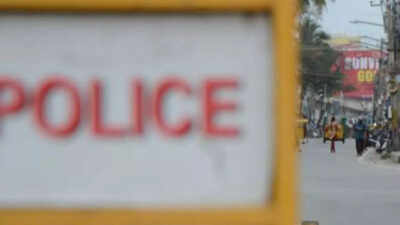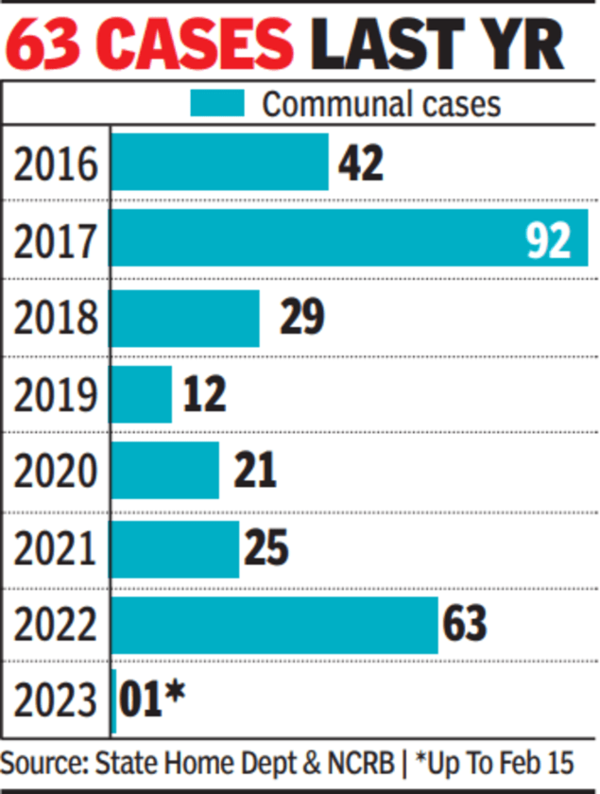Top Searches
- News
- City News
- bengaluru News
- Communal cases on the rise in Karnataka, 122 since 2019
Communal cases on the rise in Karnataka, 122 since 2019

Representative image.
BENGALURU: After multiple years of declining trend, the number of communal incidents in Karnataka appear to be increasing with the state reporting one such incident every 12 days on average between January 1, 2019 and February 15, 2023.
As per data from the home department, cases in 2022 more than doubled from the previous year to touch 63, while 2021 and 2020 - the two Covid years - have also seen more cases than 2019, indicating an increasing trend. This year has seen one case as of mid-February, reported in Kolar.

Overall, the state has seen 122 cases in the said period, with nearly 50% of them coming in 2022. And, the home department data puts Shivamogga (24), Dakshina Kannada (19 including two in Mangaluru city), Davanagere (18) and Haveri (10) among the districts with the most cases.
"Shivamogga continues to be a sensitive district and that's a fact. Even recently, we have made a few arrests of people belonging to the district," Karnataka DG&IGP Praveen Sood said.
Among other things, police say the banning of Popular Front of India (PFI) also added to the increase in communal incidents. The Centre, in September last year declared the PFI an 'unlawful association' and banned it for five years. Specifically in Karnataka, the high court on November 30, 2022, had upheld the PFI ban in the Nasir Pasha versus Union of India case.
"One major reason for increased cases is the impact of PFI ban and action thereafter. Many cases have been registered consequently when people went on a ransack," Sood added. The 152% increase in cases in 2022 has brought attention back to communal cases, which had remained under 30 since 2018, which recorded a 68% dip from 2017. In 2019, the cases further dipped to 12, before breaching the 20 mark in 2020.
According to the home department, police have been tasked with identifying sensitive areas and arranging for required bandobast, while district administrations have been instructed to identify pending issues that could lead to communal incidents and resolve them quickly.
Among other things, measures are to be put in place in sensitive areas to prevent any act or statement that could hurt the sentiments of a particular community, especially ahead of large processions or religious events.
Police are also expected to periodically hold peace meetings at the station level, remain vigilant on social media to track and act on posts that hold the potential to cause disharmony among communities.
Multiple activists TOI spoke with said reported cases don't always reflect the actual situation on the ground. "There are several instances of communal targeting that never get reported, this is especially true in some districts in Malnad and coastal regions. Also, police do not show the same eagerness (to register cases) after all incidents. In many cases, laws violating communal harmony are simply not invoked," one of them said.
As per data from the home department, cases in 2022 more than doubled from the previous year to touch 63, while 2021 and 2020 - the two Covid years - have also seen more cases than 2019, indicating an increasing trend. This year has seen one case as of mid-February, reported in Kolar.

Overall, the state has seen 122 cases in the said period, with nearly 50% of them coming in 2022. And, the home department data puts Shivamogga (24), Dakshina Kannada (19 including two in Mangaluru city), Davanagere (18) and Haveri (10) among the districts with the most cases.
"Shivamogga continues to be a sensitive district and that's a fact. Even recently, we have made a few arrests of people belonging to the district," Karnataka DG&IGP Praveen Sood said.
Among other things, police say the banning of Popular Front of India (PFI) also added to the increase in communal incidents. The Centre, in September last year declared the PFI an 'unlawful association' and banned it for five years. Specifically in Karnataka, the high court on November 30, 2022, had upheld the PFI ban in the Nasir Pasha versus Union of India case.
"One major reason for increased cases is the impact of PFI ban and action thereafter. Many cases have been registered consequently when people went on a ransack," Sood added. The 152% increase in cases in 2022 has brought attention back to communal cases, which had remained under 30 since 2018, which recorded a 68% dip from 2017. In 2019, the cases further dipped to 12, before breaching the 20 mark in 2020.
According to the home department, police have been tasked with identifying sensitive areas and arranging for required bandobast, while district administrations have been instructed to identify pending issues that could lead to communal incidents and resolve them quickly.
Among other things, measures are to be put in place in sensitive areas to prevent any act or statement that could hurt the sentiments of a particular community, especially ahead of large processions or religious events.
Police are also expected to periodically hold peace meetings at the station level, remain vigilant on social media to track and act on posts that hold the potential to cause disharmony among communities.
Multiple activists TOI spoke with said reported cases don't always reflect the actual situation on the ground. "There are several instances of communal targeting that never get reported, this is especially true in some districts in Malnad and coastal regions. Also, police do not show the same eagerness (to register cases) after all incidents. In many cases, laws violating communal harmony are simply not invoked," one of them said.

About the Author
Chethan KumarAs a young democracy grows out of adolescence, its rolling out reels and reels of tales. If the first post office or a telephone connection paints one colour, the Stamp of a stock market scam or the ‘Jewel Thieves’ scandal paint yet another colour. If failure of a sounding rocket was a stepping stone, sending 104 satellites in one go was a podium. If farmer suicides are a bad climax, growing number of Unicorns are a grand entry. Chethan Kumar, Senior Assistant Editor, The Times of India, who alternates between the mundane goings-on of the hoi polloi and the wonder-filled worlds of scientists and scamsters, politicians and Jawans, feels: There’s always a story, one just has to find it.
Start a Conversation
FOLLOW US ON SOCIAL MEDIA
FacebookTwitterInstagramKOO APPYOUTUBE









